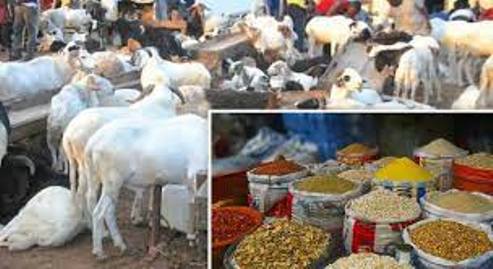LAGOS JUNE 26TH (NEWSRANGERS)-As Muslim faithful prepare for the Eid-el-Kabir celebration, price of rams and basic food commodities in various markets across Nigeria has led to widespread lamentation among Nigerians, the News Agency of Nigeria reports.
Different market surveys conducted by NAN correspondents in various states of the federation on Sunday, showed that the situation is similar in Ondo, Ekiti, Osun, Edo, Kaduna, and Borno.
Other states where traders and customers have expressed their dissatisfaction with the high prices include Yobe, Kaduna, Kano, Zamfara, Bayelsa, Kastina, Lagos Oyo and Ilorin.
Muslim faithful traditionally sacrifice rams during the Eid-el-Kabir Festival, but the surveys revealed that the inflated prices made it more difficult for people to afford it.
Apart from price hike of rams, the rising costs of food commodities have also contributed to the financial burden faced by many Nigerians.
On the other hand, ram sellers are bemoaning low patronage despite the high prices which they attributed to the affordability issues faced by potential buyers that led to decreased demand.
The combination of increased prices and low patronage has created a challenging situation for both buyers and sellers, affecting the festive spirit surrounding the Eid-el-Kabir celebration.
The price increase is also attributed to factors such as the removal of fuel subsidy by the federal government; the high cost of transportation of goods from the hinterland to the cities; unavailability of cash in circulation; as well as inflation in the country.
Muriana Balogun, a ram seller in Ikare-Akoko, Ondo State, said sales had been low and not encouraging few days to Eid-el-Kabir celebration.
Mr Balogun, who attributed the high cost of rams to subsidy removal, said that the prices of livestock were lower in 2022, compared to 2023.
“Now, prices of rams vary. Some go for N100,000, N250,000 and N320,000, respectively, depending on the size, while the least one is N50,000,” he said.
Abdullahi Abubakar, another ram seller at Shasha Market, Oba-Ile, Akure, still in Ondo, said that selling prices are determined by cost price and the cost of transportation from the Northern part of the country.
“It is not our fault; we are only selling based on the cost price of the rams we bought because transport fare is a bit higher now. People are not coming to buy like other years due to the price.
“We did not increase the prices arbitrarily. We are still hopeful that people will come to buy before Sallah,” Mr Abubakar said.
However, some traders mentioned that prices had already gone up prior to the removal of fuel subsidy, attributing it to arbitrary increases by vendors rather than the fuel subsidy removal.
Muslim Adewale, also a ram seller in Ikare-Akoko, Ondo, said the price of ram was now almost double when compared to what it was sold in 2022. He, however, blamed some vendors for increasing the price arbitrarily.
Mr Adewale, who said that subsidy removal should not result in high prices of food items, urged ram sellers, particularly those who are Muslims, to sell their animals at affordable cost during Eid-Kabir, as part of good deeds in seeking God’s blessings.
He said, “The size of ram I bought last year for N60,000 is now being sold between N95,000 and N110,000.
“I doubt if the high cost is due to the fuel subsidy removal. The cost of transporting a ram from Kano to Ikare cannot be more than N10,000. As at last year, it was between N5,000 and 7,000.
Also, Christiana Ologunde, a rice seller in the same market, stated that a 50kg bag of Nigerian rice was sold at N28,500 in 2022, while the 25kg bag was sold at N14,000, while same product is now sold for N36,000 and N19,000 respectively.
Mrs Ologunde, however, said that the fuel subsidy removal had no pronounced effect on the commodity, noting that” prices had gone up before the fuel subsidy was removed”.
According to her, patronage for the product at the market had been low because of the frequent increase in prices.
In Ekiti, Abubakar Meleh, who sells foodstuff and rams at Shasha Market in Ado-Ekiti, said a big ram was sold for N200,000 last year, but now N250,000 or more.
“As it is currently, a medium sized ram is now N180,000, but was N120,000 last year, and small rams range between N50,000 and N100,000, depending on the size.
“We have limited stock of ram this year, compared to last year because there isn’t much money in circulation in the country.
“We are not expecting good profit this year because of low sales and high cost of transportation from the North,” Meleh said.
Also, Yomi Ayorinde, a frozen food seller in the same market, who said price of a carton of frozen fish had only increased slightly, noted that there would be a further increase in prices in few days because of the Sallah celebration.
Another trader, who sells yam at Okesa market, Aina Ogunyemi, said 100 tubers of yam was sold for N150,000, while five tubers of yam was sold for between N5,000 and N6,000 depending on the size of the yam.
She said yam was expensive now since the new yam was not yet abundant in the market.
A pepper seller, Elizabeth Olawale, said a basket of tomatoes was now between N58,000 to N60,000, as against N45,000.
“The small basket of hot pepper (scotch bonnet) that we were buying for N5,000 and N6,000 is now N10,000.
“Bawa (cayenne pepper) is now N30,000 a basket, as against N26,000 we used to buy it before,” she said.
A vegetable oil seller, Zekinat Ayoola, said a five-litre gallon of King’ s vegetable oil was now N15,000, while five litres of Golden Penny vegetable oil now cost N9,000.
Sallah: Shoppers groan as Lagos records highest prices of foodstuffs, rams in 7 years
Shoppers at some markets in Lagos State, which include Mile 12, Karu and Ajah, also expressed concerns over the astronomical increase in prices of foodstuff and animal proteins, describing the 2023 situation as the highest in the last seven years.
NAN reports that an average large size ram ranged from N150,000 to N600,000 against the N80,000 to N150,000 in the same period last year.
Cows ranged between N350,000 to N1,200,000 this year against the N250,000 to N600,000 in 2022.
Femi Odusanya, spokesman, Mile 12 market, described the sales situation in the market as poor noting that the purchasing power of residents was almost nonexistent.
Mr Odusanya said factors that contributed to the rising cost of foods include the increase in cost of premium motor spirit after the subsidy removal and poor investment in the agricultural value chain.
“Farmers and markets move goods with small trucks which are largely petrol powered instead of articulated vehicles.
“This is is so because many actors in the value chain do not have the financial capacity to buy diesel engined heavy trucks which ordinarily are cost effective for goods transportation.
“The inflationary cycle on goods and services is expected to continue due to the multiplier effects of fuel subsidy removal on the economy.
“Things are extremely expensive and government must do something about this particularly farm produce and stable farm commodities by investing heavily in the agriculture value chain to cushion the effects on poor Nigerians.
“If prices of agricultural goods and services are relatively stable; the people would appreciate it and be able to get the necessary nutrients they need instead of just barely surviving as they are currently doing,” he said.
Folakemi Fatunde, said the fear that accompanied shopping this year alone had resulted in High Blood pressure for her.
She noted that with every passing day, as the cost of basic food items continue to soar.
A trader at Ajah Market, Loveth Nwokedi, noted that sales had dwindled badly as people only bought what they needed for the day against the usual bulk buying of before.
She stated that asides perishable food items, soup condiments, vegetables, palm oil and ground nut oil had also soared by over 50 per cent.
She urged government to focus on the poor this period by augmenting their source of income with the necessary palliatives and social services needed to improve the standard of living.
“The government needs to be more understanding with all these policies they are churning out as it seems they are not thinking of the ordinary Nigerian in all of these things they are doing,” she said.
The market survey also revealed that in Ilorin, markets along Fate Road and beside Shop Rite show traders complaining about the low patronage.
“Then, as a result of the high level of patronage, we used to travel to the northern part of the country twice or thrice in the last few days to the Sallah celebration.
“But since we began Sallah sales two weeks ago, we have been selling only four to five animals daily. However, sales this week sale have been discouraging because we now hardly sell two animals in a day,” Omotosho Onimago, a ram seller said.
In Ibadan, at markets like the Bodija foodstuff market, Bodija Ram market and Sasa pepper market, as well as the Akinyele and Alesiloye ram markets, the general complaint was that of how hard the times are.
One of the respondents, Aliu Sanda, who said he was a herdsman said prices of cows had to go up because of the cost of transporting them from their places to town. Another ram seller, Muhammadu Kasim lamented the general hike in transport fares to corroborate Mr Sanda’s argument, saying “this has made ram prices to be high”.
Daily Nigeria












